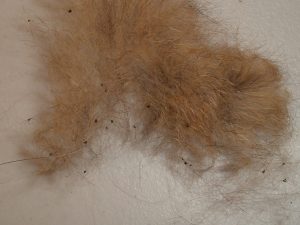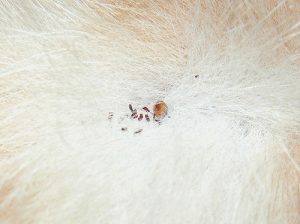How do I stop my companion animal from getting fleas?
Fleas are external parasites. The most common type of flea that affects companion animals is the cat flea. These fleas can also infest dogs, rabbits, guinea pigs, rats, mice, chickens, wildlife and humans.
Why are fleas a problem?
Flea bites are irritating and painful and can lead to skin damage, severe allergies and infections. In very young or old animals, blood loss from heavy flea infestations can cause anaemia. Fleas can also transmit other disease-causing micro-organisms (e.g., internal parasites, viruses).

Dog infested with fleas.
How do animals get fleas?
Animals get fleas from the environment, and from other infested animals as the fleas jump from one animal to another. Adult fleas attach to an animal, feed on blood, and lay eggs on the fur. Flea eggs end up in the surrounding environment (e.g., on bedding, under furniture, in carpets, under the house, in soil). In warm humid conditions, and when they detect the presence of animals, flea eggs, larvae and pupae mature into adult fleas, and so the cycle continues. As conditions favourable to fleas are more widespread, frequent and prolonged with climate change, fleas are becoming even more of a problem.

Flea dirt in hair from brushed cat.
Regular grooming allows you to check if your pet has fleas. Adult fleas are tiny (1-2mm) and dark brown, and may be seen moving through the fur or on the skin. If you suspect fleas but cannot find them, check for ‘flea dirt’ (flea poo). Run a fine-toothed comb through the fur and tap on a wet tissue. Flea dirt will stain red because it contains blood.
Signs that your animal may have fleas include red skin, hair loss and/or thickened skin. Not all pets will be itchy but intense scratching, itching and chewing can indicate a flea infestation and/or flea allergy, which should receive prompt veterinary attention.

Adult fleas in dog hair.
How do I prevent and treat flea infestations?
Use a flea preventative product throughout the year. Your veterinarian can give you advice about the most suitable product for your pet and how often this should be applied. It is not advisable to purchase flea preventative products from a supermarket without veterinary advice. There is also no evidence that alternative treatments (e.g., tea leaves, citronella) are effective against fleas. To be effective, treat all pets in the household with a product that is suitable for each individual. Follow veterinary advice closely. Only use products that are safe and effective for the species.
WARNING: Flea preventative products designed for dogs can be fatal if given to cats.
If your animal is experiencing flea problems, you must also treat the environment to remove flea eggs, larvae, and pupae (which can survive for weeks to months). Consult your veterinarian about safe and effective products you can use to treat the environment. Every week until the infestation is cleared, vacuum floors and furniture, wash bedding at a high temperature, and spray outdoor kennels, runs or enclosures. If there is severe infestation, dust skirting boards and other crevices with insecticide powder and use surface sprays.
Particularly if your animal is suffering from a flea allergy, seek prompt advice from your veterinarian about safe and effective prevention and treatment.
Was this article helpful?
This work is licensed under a Creative Commons Attribution-NonCommercial-NoDerivatives 4.0 International License.


